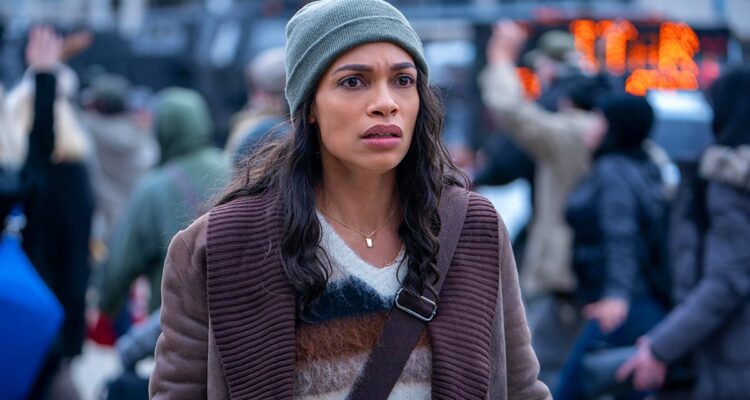Based on the DC Comics series from Riccardo Burchielli and Brian Wood of the same name, the demilitarized zone of Roberto Patino’s four-part HBO series “DMZ” can be full of surprises. It’s what we know as Manhattan, after a civil war between the Free States of America and the United States of America. We initially see the DMZ as a place of ruins, of sprawling weeds taking over once busy intersections, but then realize the possibility it shows. There are no police; the McDonald’s sign is a mere trash heap; different neighborhoods have created their own vibrant communities, like the gangs in Walter Hill’s “The Warriors.” It only looks like “I Am Legend,” especially when we get a sense of the 300,000 people making it their proud home. “DMZ” can be compelling however emotionally broad in observing what parts of our modern humanity would survive in a potential war zone, especially when a new democracy is at stake.
READ MORE: The 70 Most Anticipated TV Shows & Mini-Series Of 2022
A medic named Alma (Rosario Dawson) sneaks into the DMZ from the U.S., hoping to find her son, Christian, who she was separated from eight years ago when the civil war started and New York City had to be evacuated. She quickly finds that it’s like the Wild Wild East, and witnesses a theater of power starring men she knew in a previous life. A former worker named Wilson (Hoon Lee) has now become a slick leader of Chinatown, with his own army of armed bodyguards and sharp suits. Alma’s ex-partner, Parco (Benjamin Bratt), and the father to Christian, now leads the Spanish Harlem Kings. Bratt is a force to be reckoned with in the role, having a swagger and ease to him not unlike Jack Nicholson in “The Departed,” commanding his men from behind golden aviators and vividly conveying the sense of power that is to be fought for. Wilson and Parco are both running for governor of the DMZ, with fierce platforms that are supported by dodgy behind-the-curtain power moves. And credit to how the plotting works, even though it’s mighty convenient that Alma knows these two men so closely, it doesn’t take away from the story but makes everything more intimate, immediate.
It’s with these characters that the plotting of “DMZ” surprisingly evolves from Alma’s urgent quest of finding her son to her helping influence the election; she becomes more aware of the destruction awaiting the DMZ if the wrong person comes into power. On the outside of this drama is the peaceful Oona (Nora Dunn), who controls the DMZ’s vital water supply and can hush a riled-up crowd whenever she appears. She knows, like other women, that there is no fruitful future to be found when men are in charge. The violent chaos that eventually erupts proves them right.
“DMZ” leads with its emotions and can have a tough time balancing its dystopian grit with its sentimentality. As if trying to pander to younger audiences, it sometimes focuses on Nico (Venus Ariel) and her friend Odi (Jordan Preston Carter), two young kids who always find themselves in the middle of the latest squabble; Odi also sometimes has visions of his grandfather, who we learn early on has been decomposing in their living room.
The most emotionally broad arc here might be with Christian’s story. When we meet him eight years later after being separated from his mother, he’s a hard-worn killer known as Skel, working for his father Parco and stirring up chaos, spray-painting the names of his kills on city walls. With all this context, the story bases a good deal of its sappier stakes on if the Christian inside him can still be saved from Skel. Not long after the two are soon aware of each other’s presence, Alma tries to get through to him by talking about the past, and it can make for maudlin moments, or later on, scenes of exposition that are too clunky to be as moving as they want to be. It’s far more emotional what the story is trying to express about humanity, that Skel maybe isn’t a lost soul, than how this character embodies it.
But the show gets a formidable momentum from its style, as directors Ava DuVernay (who helmed the pilot) and Ernest Dickerson (who directed the other three) have a distinct plan for how this building chaos of backstabbing and rehashed relationships can always pop. Even if the world-building is written in shorthand to the point of distraction—we’re not given a lot about the DMZ’s history or shortcomings, but life seems stable enough aside from water—the series is reliably packed with a style that always embraces a striking lens choice or washes its characters with heavy neon reds and greens. A battle in Chinatown in Episode 3 is particularly well accomplished by Dickerson, showing the action and scope that can be achieved when a legendary cinematographer is in the director’s chair. It’s also no mistake that certain shots of neighborhoods recall the lively, packed streets of Spike Lee’s “Do the Right Thing,” which Dickerson was the cinematographer for.
Throughout the story, Dawson has her own emotional electricity, giving a tough performance of fascinating determination and moral clarity. And because of Dawson’s strength, it becomes believable about the lunges that Alma takes with her convenient, growing place in the DMZ; it becomes powerful that she doesn’t take up a gun but she can heal people, either as a medic or as the series’ star-spangled idealist. Dawson offers a through-line to this story that can be a little emotionally broad or not as impactful as its main drama. Alma’s spirit may be one of the many sentimental symbols in this saga, but like the best parts of “DMZ,” it still hits home. [B]

